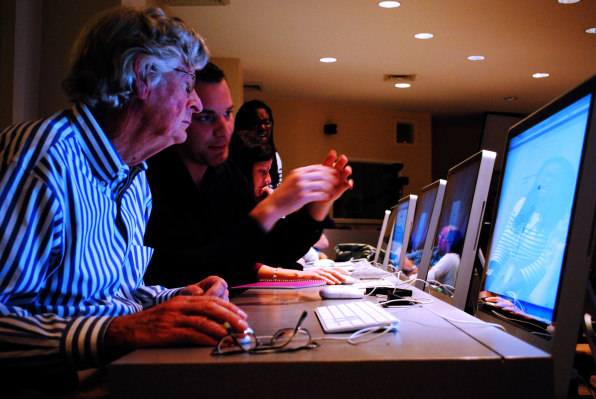What Is Motivating Baby Boomers to Return to College Upon Retirement?
Five years ago, in 2011, the first wave of the oldest U.S. babe boomers reached the common retirement historic period of 65. Since then, another 10,000 each day continue to reach this stage in their lives. The U.Due south. Demography Bureau calculates that by 2020, 55.ix million people in the U.Due south. will be age 65 or older, and by 2030, that number will reach 72.7 million.
How volition all these crumbling boomers thrive in the 21st century? According to many experts on aging, information technology'south increasingly by staying in the workforce, at the very least on a function-time basis. Equally noted by Gallup in their "Many Baby Boomers Reluctant to Retire" report, "Most half of boomers still working say they don't expect to retire until they are 66 or older, including one in 10 who predict they will never retire."
Staying Healthy By Working Longer
Boomers don't consider themselves sometime until effectually 72 years of historic period, claimed a Pew Enquiry Center study. And most long-held culturally and historically embedded notions about how to retire are quickly becoming outdated. Many boomers no longer see themselves playing shuffle board, golfing, fishing and generally relaxing for the remainder of their days. Plus, historic period-related scientists at present posit that a life overly focused on leisure and passive amusement could really promote poor wellness.
A 2014 study conducted past the Rush University Alzheimer'due south Disease Center in Chicago points to living a life of purpose (identified as having a strong sense of meaning, which oftentimes comes from essential paid employment and/or volunteer work) as highly conducive to reducing ane'due south susceptibility to stroke, dementia, move problems, disability, and premature death. In short, full retirement is not a smart or healthy selection.

The Growing Unretired Cottage Industry
At that place is an expansive cottage manufacture that supports the opting-out-of-retirement boomer explosion. The AARP's Life Reimagined site, for instance, features a large diverseness of services focused on assisting boomers with remaining active in the labor force. Since 2006, the growing Encore.org, an organisation known for "advancing second acts for the greater good," has provided numerous services related to crumbling boomers, including "The Purpose Prize," awarded to more than 500 over-60 innovators who have brought their skills and talents to communities all over the world.
A service in Phoenix called Feel Matters is an example of how third-party concern entities are bringing together boomers and nonprofit organizations. As noted on their site, "Sixty-8 to seventy-six percent of the boomer population is in a position both financially and physically to appoint in meaningful volunteer or skilled service opportunities." Job sites that emphasize opportunities specifically for boomers are also a growing function of this promising cottage manufacture, with names similar retirementjobs.com and retiredbrains.com.
Crumbling Experts Endorse Active Appointment
"There are a lot of organizations all over the state that are coalescing around this working-longer theme and helping people figure it out," says Chris Farrell, author of Unretirement: How Baby Boomers Are Changing the Way We Think About Piece of work, Customs, and the Good Life. "People are using different phrases such equally meaning and money, passion and a paycheck, and this notion of reimagining and rethinking."
"The large matter is that people are living longer," says Nancy Collamer, author of Second-Act Careers: 50+ Means to Turn a profit from Your Passions During Semi-Retirement and owner of an informational site for boomers chosen mylifestylecareer.com. "Then you have a dynamic where people work in their primary careers for as long as 40 years, requite or take, and then they could be looking at a retirement that lasts xxx years–that is a lot of years to fill and a lot of years to fund."

Not Without Challenges
Paul Irving, editor of The Upside of Aging and chairman of the Milken Establish's Center for the Future of Crumbling, explained how a diversity of challenging circumstances are often the root cause for boomers not retiring. "There are different reasons why retirement is changing," he said. "Many people take dramatically inadequate and in some cases no savings beyond social security. The increasing costs of wellness intendance and housing present a remarkable challenge. The opportunity to generate income for a longer period of time is not an elective for fun and interests. It is a need for resources and the opportunity to maintain an acceptable life."
According to a Fidelity Investment retirement health care cost estimate, "A couple, both aged 65 and retiring this year, can now expect to spend an estimated $245,000 on wellness intendance throughout retirement, up from $220,000 last yr. The figure has increased 29% since 2005, when information technology was $190,000."
Overall, there'south plenty to scrutinize and act on, both politically and socially, to ensure that the aging boomer generation gets the support they need to keep working productively. "More people are having conversations near information technology," Farrell said. "We do non take enough institutionalized offerings similar phased retirement programs and flexible work schedules. There are a lot of laws that get in difficult for companies to rehire function-time, one-time employees. There is a lot of underbrush to be cleaned out so that information technology becomes much simpler for people to go on working."
"As a general matter, this is one of those great challenges we need to address equally a guild," Irving said. "Both as individuals and as a broader lodge, nosotros should exist encouraging it, enabling it, celebrating it, and making sure that it is an opportunity for all of those who cull to exercise it."
Collamer referred to the historical dismantling and decrease in pension funds and other employer-paid retirement funding opportunities. "As more employers start to face up the so-called brain bleed of losing primal talent in institutional cognition, hopefully we will get-go to run into a rise in employers who will offer their employees some form of retirement benefits," she said. In addition, Collamer described the problem of age discrimination in the workplace as being "real, with a lot of people experiencing difficulties finding good, quality role-time work after they retire from their full-fourth dimension jobs."
Boomers are starting to tackle such challenges in a 21st-century way by going online. "The opportunities for doing things similar freelancing and consulting work and establishing products and services that you lot sell on the web accept become real possibilities for boomers," Collamer said. "The amount of coin required to start online businesses is far less than if you were to try to plant a brick and mortar business organisation."
In a recent weblog post, Gig Economy: Better for Boomers Than Millennials, on the PBS Next Avenue site for people over 50, Ferrell wrote that "boomers will increasingly and gladly gear upwardly for the gig economy every bit they enter their 60s and 70s. Already, Uber says more of its drivers are over 50 than under 30, and that nigh a quarter of its drivers are 50 and older. Last year, incidentally, Uber and AARP's Life Reimagined teamed up to help Uber discover more 50-plus drivers."
The baby boomer generation has lived though decades of radical political and social change, then information technology should be no surprise that they are also revolutionizing retirement.
Source: https://www.fastcompany.com/3056475/why-baby-boomers-refuse-to-retire
0 Response to "What Is Motivating Baby Boomers to Return to College Upon Retirement?"
Post a Comment